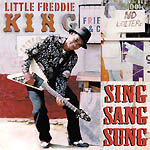|
Little Freddie King Sing, Sang, Sung Orleans OR 2511 |

|
Although the backwoods of Mississippi are only a few hours away, the down-home Delta blues style has, for the most part, evaded the Crescent City. But Little Freddie King, who spent his first 16 years in Mississippi, arrived in New Orleans almost 45 years ago with his own conception of how to approach playing music, and he’s been developing it ever since. It’s the same sound that fired the work of Muddy Waters, Jimmy Reed and Freddie’s cousin, the great Lightnin’ Hopkins; thus there’s no trace of the city’s classic R&B sound in the music of Little Freddie King. This is blues, Mississippi-style.
Sing Sang Sung captures the spirit of one of those magical nights when Little Freddie emerges from his daytime life as a professional mechanic and takes his act to the stage, delighting the legion of New Orleans blues scholars that always shows up for his gigs. Recorded "live" at the Dream Palace, a funky little joint located just outside the French Quarter, this soulful demonstration of the raw power of Little Freddie King adds another chapter to the rich recorded legacy of New Orleans music.
The title cut, a tasty instrumental, opens up the proceedings and sets the mood for a whiskey-soaked evening of juke-joint blues. "Do She Ever Think of Me" spotlights Little Freddie’s unique vocal moanings; there’s nothing pretty about his voice, but it definitely hits hard. Little Freddie King deserves a place at the same table with the artists associated with Fat Possum Records; he’s right in there on that same raw groove.
As with most important contemporary blues recordings, what ensures the success of Sing Sang Sung is the strength of its original tunes. Songs like "Bucket of Blood," where King reminisces over one of his old back-of-town haunts, or "Bad Chicken," a recreation of the clucking sounds Little Freddie remembers from his childhood on the farm, give this offering its musical teeth. Little Freddie is a natural — he rips it up on covers like the Freddie King instrumental "Hideaway" and Lightnin’ Hopkins’ "Rocky Mountain," but this is a performer with a voice of his own, and that elevates this recording to a superior level.
— Bill Taylor
| ©2000 Blues Access, Boulder, Colorado, USA |